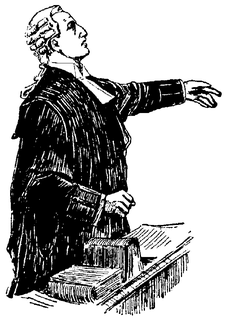
A barrister is a type of lawyer in common law jurisdictions. Barristers mostly specialise in courtroom advocacy and litigation. Their tasks include taking cases in superior courts and tribunals, drafting legal pleadings, researching the philosophy, hypothesis and history of law, and giving expert legal opinions.

Jurisprudence or legal theory is the theoretical study of law. Scholars of jurisprudence seek to explain the nature of law in its most general form and provide a deeper understanding of legal reasoning, legal systems, legal institutions, and the role of law in society.

A lawyer or attorney is a person who practices law, as an advocate, attorney, attorney at law, barrister, barrister-at-law, bar-at-law, canonist, canon lawyer, civil law notary, counsel, counselor, counsellor, solicitor, legal executive, or public servant preparing, interpreting and applying law, but not as a paralegal or charter executive secretary. Working as a lawyer involves the practical application of abstract legal theories and knowledge to solve specific individualized problems, or to advance the interests of those who hire lawyers to perform legal services. The role of the lawyer varies greatly across different legal jurisdictions.

Roman law is the legal system of ancient Rome, including the legal developments spanning over a thousand years of jurisprudence, from the Twelve Tables, to the Corpus Juris Civilis ordered by Eastern Roman Emperor Justinian I. Roman law forms the basic framework for civil law, the most widely used legal system today, and the terms are sometimes used synonymously. The historical importance of Roman law is reflected by the continued use of Latin legal terminology in many legal systems influenced by it, including common law.
Sharia, Islamic law or sharia law is a religious law forming part of the Islamic tradition and legal system. It is derived from the religious precepts of Islam, particularly the Quran and the hadith. In Arabic, the term sharīʿah refers to God's immutable divine law and is contrasted with fiqh, which refers to its human scholarly interpretations. The manner of its application in modern times has been a subject of dispute between Muslim fundamentalists and modernists.
In law and government, de facto describes practices that exist in reality, even though they are not officially recognized by laws. It is commonly used to refer to what happens in practice, in contrast with de jure, which refers to things that happen according to law.
In most common law jurisdictions, the attorney general or attorney-general is the main legal advisor to the government. The plural is attorneys general or attorney generals.
The judiciary is the system of courts that interprets and applies law in legal cases.

A court is any person or institution, often as a government institution, with the authority to adjudicate legal disputes between parties and carry out the administration of justice in civil, criminal, and administrative matters in accordance with the rule of law. In both common law and civil law legal systems, courts are the central means for dispute resolution, and it is generally understood that all people have an ability to bring their claims before a court. Similarly, the rights of those accused of a crime include the right to present a defense before a court.
A solicitor is a legal practitioner who traditionally deals with most of the legal matters in some jurisdictions. A person must have legally-defined qualifications, which vary from one jurisdiction to another, to be described as a solicitor and enabled to practise there as such. For example, in England and Wales a solicitor is admitted to practise under the provisions of the Solicitors Act 1974. With some exceptions, practising solicitors must possess a practising certificate. There are many more solicitors than barristers in England; they undertake the general aspects of giving legal advice and conducting legal proceedings.
A lawsuit is a proceeding by a party or parties against another in the civil court of law. The archaic term "suit in law" is found in only a small number of laws still in effect today. The term "lawsuit" is used in reference to a civil action brought in a court of law in which a plaintiff, a party who claims to have incurred loss as a result of a defendant's actions, demands a legal or equitable remedy. The defendant is required to respond to the plaintiff's complaint. If the plaintiff is successful, judgment is in the plaintiff's favor, and a variety of court orders may be issued to enforce a right, award damages, or impose a temporary or permanent injunction to prevent an act or compel an act. A declaratory judgment may be issued to prevent future legal disputes.

The Juris Doctor degree, also known as the Doctor of Jurisprudence degree, is a graduate-entry professional degree in law and one of several Doctor of Law degrees. The Juris Doctor is earned by completing law school in Australia, Canada, the United States, and some other common law countries. It has the academic standing of a professional doctorate in the United States, a master's degree in Australia, and a second-entry, baccalaureate degree in Canada.
In law, a legal person is any person or 'thing' that can do the things an everyday person can usually do in law - such as enter into contracts, sue and be sued, own property, and so on.
A trade name, trading name, or business name is a name used by companies that don't want to operate under their registered name. The term for this type of alternative name is a "fictitious" business name. Registering the fictitious name with a relevant government body is often required.
Bachelor of Laws is an undergraduate law degree in England and most common law jurisdictions—except the United States and Canada—which allows a person to become a lawyer. It historically served this purpose in North America as well but was phased out in favour of the Juris Doctor degree. Bachelor of Laws is also the name of the law degree awarded by universities in Scotland ,South Africa.and Zambia
A company, abbreviated as co., is a legal entity made up of an association of people, be they natural, legal, or a mixture of both, for carrying on a commercial or industrial enterprise. Company members share a common purpose, and unite to focus their various talents and organize their collectively available skills or resources to achieve specific, declared goals. Companies take various forms, such as:

International law, also known as public international law and law of nations, is the set of rules, norms, and standards generally accepted in relations between nations. It establishes normative guidelines and a common conceptual framework to guide states across a broad range of domains, including war, diplomacy, trade, and human rights. International law thus provides a means for states to practice more stable, consistent, and organized international relations.

Law is commonly understood as a system of rules that are created and enforced through social or governmental institutions to regulate conduct, although its precise definition is a matter of longstanding debate. It has been variously described as a science and the art of justice. State-enforced laws can be made by a collective legislature or by a single legislator, resulting in statutes, by the executive through decrees and regulations, or established by judges through precedent, normally in common law jurisdictions. Private individuals can create legally binding contracts, including arbitration agreements that may elect to accept alternative arbitration to the normal court process. The formation of laws themselves may be influenced by a constitution, written or tacit, and the rights encoded therein. The law shapes politics, economics, history and society in various ways and serves as a mediator of relations between people.
This collection of lists of law topics collects the names of topics related to law. Everything related to law, even quite remotely, should be included on the alphabetical list, and on the appropriate topic lists. All links on topical lists should also appear in the main alphabetical listing. The process of creating lists is ongoing – these lists are neither complete nor up-to-date – if you see an article that should be listed but is not, please update the lists accordingly. You may also want to include Wikiproject Law talk page banners on the relevant pages.